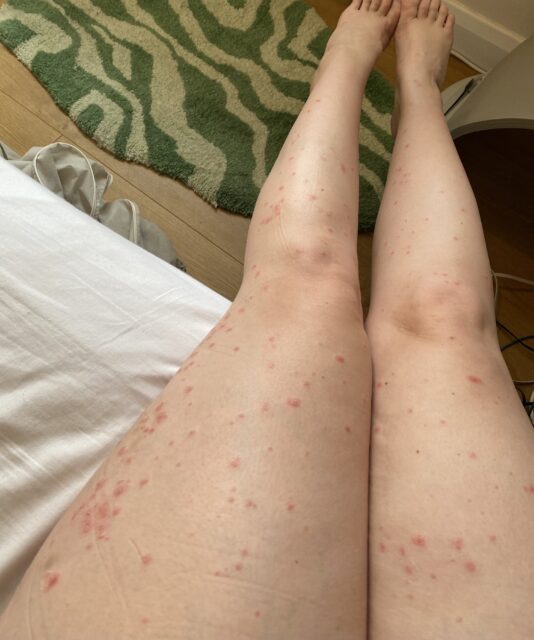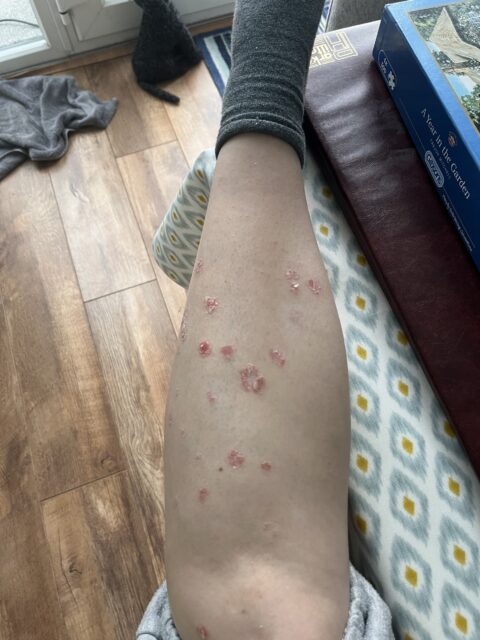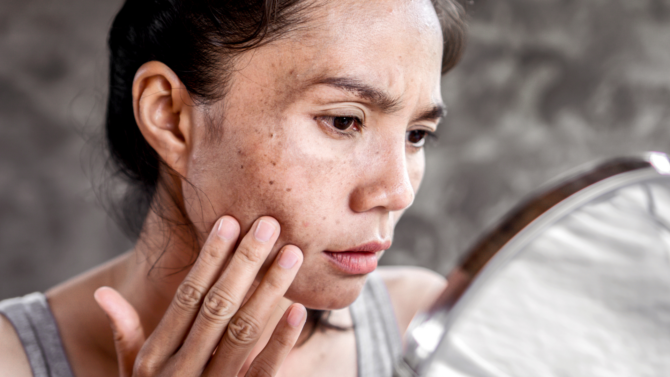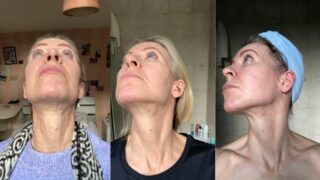I never paid any attention to psoriasis before I got it.
I knew what it was but would only ever think about it when I was writing about it – if, say, I was reporting on the extent to which skin conditions affects sufferers’ mental health, or a product launch for inflamed skin. I didn’t know that you could develop psoriasis as an adult – I’ve had mild eczema here and there since I was a baby, and at 29 I blissfully assumed that a bit of dryness and itchiness every now and again was as bad as it would ever get for my skin.
But then I got covid. At first I tested negative but I had tell-tale symptoms – sore throat, exhaustion, a constant migraine, generally feeling rubbish – and a mysterious rash along the bottom of my stomach. Within a day the same little red, sore and itchy patches were dotted all over my legs and feet. I had no idea what was happening to my skin.

Getting a diagnosis for psoriasis
I asked a couple of doctor friends for their opinions, but no one could diagnose it – everything from hives to pityriasis rosea (a temporary rash that can be triggered by a virus) was suggested. My GP said it was vasculitis and that I should go to A&E, which I didn’t, only because I know my body and I was 100% certain that it wasn’t anything that warranted taking up a space at the hospital.
It was a podiatrist who eventually pointed out that the patches on my feet looked like psoriasis, so I did some googling and it turned out what I had appeared to be exactly like guttate psoriasis (a type of psoriasis that can develop suddenly, particularly in people under 30, often following an infection, where the red, scaly patches of skin are shaped like little spots – in Latin, ‘gutta’ means a drop of liquid). And it further turned out that there were early reports of people developing guttate psoriasis around the same time they had covid.
What treatment did I try for psoriasis?
So, there I was with an auto-immune skin disease. As a journalist specialising in aesthetics and skincare, I’m always giving people advice on how to get better skin, but how could I, when my own skin looked like that? Even though it was just on my legs (my stomach cleared up randomly), it was always on my mind, especially during the summer when I couldn’t avoid getting my legs out. It also meant I couldn’t use fake tan. Pale and with legs covered in red, scaly patches, I felt pretty gross.
I used a strong steroid cream for a bit which worked amazingly at first, but as soon as I stopped using it the patches came back with a vengeance. So then I tried all manner of alternative treatments – Chinese medicine creams, LED light, Ayurvedic skin balm, a probiotic formulated specifically for skin conditions – and nothing made any difference.

Almost a year later and after exhausting all these options, I was ready to admit defeat and just live with it. At least it wasn’t on my face or upper body, and people deal with much worse without fuss. Until one morning my postman, when I answered the door in pyjama shorts, commented on the ‘rash’ on my legs. It was out of friendly concern, but it made me feel rubbish.
What a dermatologist advises for psoriasis
Pretty much the only thing I hadn’t tried at this point was a dermatologist – which I know sounds hypocritical, but I really thought I could sort it on my own. Finally, Alice suggested a visit to TTG-registered derm Dr Ariel Haus and now I can’t believe I waited so long to see a professional. Dr Haus examined the psoriasis, confirmed my diagnosis and the likelihood that it was linked to catching covid, and was confident it could be managed with topical treatment.
He couldn’t emphasise the importance of moisturisation enough, especially during the winter, and told me to completely avoid any kind of scented or soap-based products. I did know this in theory but, thinking that I was just stuck with it, I had slipped back into using normal body washes and forgetting to moisturise my body regularly. Dr Haus prescribed three things:
- A Eucerin shower and bath oil with a high concentration of omegas 3 and 6
- A 10% urea body lotion with ceramides and natural moisturising factors, also by Eucerin
- A prescription ointment specifically for psoriasis containing a combination of a potent steroid and a synthetic type of vitamin D3.
His instructions were to apply the cream onto the patches twice a day and moisturise daily. I’ve been following this plan for a few weeks now and am so relieved to see the psoriasis fading, plus my skin is far, far less itchy.
I’m hoping that next summer, my legs will be back on show again.
If you can relate…
None of this is intended to be medical advice, but rather a lesson learned that I want to pass on. If anything weird happens to your skin, go straight to a dermatologist. They deal with skin conditions day in, day out, and – unlike GPs, few of whom have any training in recognising skin problems – they’ll know exactly what your skin condition is and what it isn’t, and will be able to get it under control. And for anyone else struggling with psoriasis, I know how you feel and hope I’ve been able to help. Please do get in touch if you’d like us to cover skin conditions like psoriasis more frequently.
The Tweakments Guide Takeaway
The new skin rule I tell everyone now? If in doubt, see a derm. Dr Haus said he too wishes I went to see him sooner – I could have had a summer with my psoriasis under control rather than feeling self-conscious when my legs were on show. And yes, skin conditions aren't the worst thing someone can suffer from, but it's completely valid to feel down about it and to invest in getting your skin back.
Join Our Mailing List
This is the best way to stay in the loop with our latest news and updates, including industry titbits and tailored offers.
Related Stories

Concerns
Where To Find The Best Advice From TTG’s Leading Practitioners
Have a burning question about tweakments and/or skincare? Premium spots for The Tweakments Guide Live may...

Concerns
Tone, Sculpt, Reduce: Our Favourite Body Contouring Tweakments
If you are struggling with stubborn fat and sagging skin that doesn’t want to budge even with a healthy...

Concerns
Try These Next-Gen Facials For Your Pre-Christmas Party Prep
From providing an instant skin glow to targeting fine lines and sun damage, the next generation of advanced...

Concerns
How To Treat Your Hyperpigmentation With Our Favourite Treatments
The clocks have gone back and the nights are getting colder – but at least there’s a light at the...







 The Tweakments Chatbot
The Tweakments Chatbot